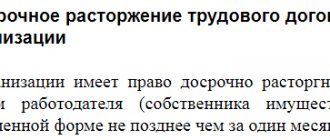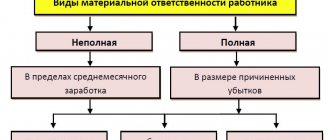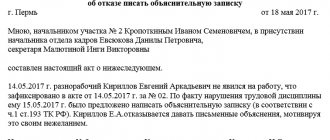When conducting an inventory, a shortage of inventory items may be identified. Let's consider the features of reflecting in the 1C program operations to withhold the amount of the shortfall from the salary of an employee found guilty.
You will learn:
- how to attribute the amount of the shortfall to the guilty person;
- how to reflect the deduction of the shortfall from the wages of the guilty employee;
- how to check mutual settlements with an employee based on the results of damage deduction.
Refund of erroneously paid amounts due to an accounting error
This situation arises when, as a result of a counting error, the employee was paid more wages than expected. Please note that Rostrud relies on the opinion that a counting error is an error that was made during arithmetic operations (Rostrud letter dated October 1, 2012 No. 1286-6-1). Well, for example, at an enterprise an employee works according to a tariff, that is, payment is rubles per hour. The salary calculator incorrectly multiplied the cost of an hour by the time worked; as a result, the person was overpaid.
What to do?
To withhold overpaid amounts, the employee's written consent is required. If there is no agreement, the employer is forced to either forgive him this amount or go to court, where he will need to prove that a calculation error occurred.
Another example:
The employee resigned voluntarily. The final settlement with him has been made. It turned out that his wages were calculated incorrectly and he was given extra money. As a result of the check, it turned out that the error occurred due to a glitch in the 1C program.
A letter was sent to the former employee asking him to return the overpayment, but he ignored it. Then the employer went to court and proved that the reason for the overpayment was a calculation error. The court accepted the employer's position and ordered the former subordinate to return the money.
The situation was considered in case No. 2-1879/2015 dated 07/07/2015 of the Kiselevsky City Court.
Documentation
The documentary aspect plays a key role here. Any identified result must initially be documented. Often, if the volumes of valuables are not too large, a special reconciliation act is created, which indicates a complete list of things on the balance sheet. Further, they note what actually exists.
If the volumes are too large, then the discrepancies simply need to be entered into the act. After this, orders will be issued on how to punish the perpetrators. In this case, it is necessary to prepare documents confirming compliance with all preventive measures. For example, if a storekeeper proves that the warehouse is not provided with adequate protection from thieves, then it will be difficult to accuse him of anything.
If the amount of natural loss allowed for write-off is not exceeded, then an additional act of writing off the shortage is drawn up.
Repayment of advances issued under different circumstances
One of these circumstances is a business trip . The employer can give the employee money for future business expenses on account. an expense report within three days and attach to it receipts from the hotel, printouts of electronic train or plane tickets and other documents confirming expenses. If the employee does not report, the employer has the right to withhold previously paid money from his salary. But only if two conditions are met:
- Availability of written consent from the employee to withhold.
- A month has not yet passed since the day when it was necessary to submit an advance report or return the money.
If there is no agreement or the period has already expired, then the employer can recover the accountable amounts only through the court.
Grounds for collecting compensation
In order for an employer to receive compensation for losses caused by an employee’s fault, it must have grounds.
They can be:
- appointment of an employee as responsible for the property assets of the enterprise during employment;
- actual damage to the company’s values has been recorded;
- documents confirming the shortage are drawn up in accordance with all rules and standards.
Important. Recovery of compensation for shortfalls is possible only if these grounds exist.
Calculation example 1
The subordinate did not account for the advance in the amount of 24,000 rubles and did not return this money. The accountant received his consent to deduct this amount from wages. His monthly earnings are 40,000 rubles. It turns out that you can only withhold 8,000 rubles (40,000 × 20%). But next month you can also withhold 8,000 rubles (depending on the amount of accruals). Deductions will continue from subsequent payments, because it may take several months to return the entire accountable amount.
Repayment of the advance may also include overpaid amounts of vacation pay that arise when an employee is recalled from vacation. As a rule, in such cases these amounts are reclassified from vacation pay to wages received in advance.
I note that if the deduction is obvious (after all, he was paid in full for all days of vacation earlier), the employer needs to issue a corresponding order no later than one month from the date of payment, and also obtain the written consent of the subordinate to deduct this amount from wages.
Another common situation is when an employee took a vacation in advance , and now decides to quit .
According to Art. 122 of the Labor Code of the Russian Federation, an employer can provide an employee with annual paid leave in advance. For example, an employee worked in the organization for 6 months. It turns out that he is entitled to 14 days of vacation. But the man asked to be given 24 days leave. The employer agreed, provided and paid for an additional 10 days in advance.
Shortly after this, the employee decided to quit, and he was overpaid in vacation pay. The employer has every right to withhold the overpayment from the final payment upon dismissal. In this case, the employee’s consent is not required if the amount of deduction does not exceed 20% of his calculation.
Natural attrition process
This process is specifically provided for at the legislative level. Not all goods can be sold in full without losses. For example, if we are talking about food products or materials for sewing things. It is impossible to realize or use all the material resources without any remainder. During storage, some may deteriorate. Doing anything to find the culprits in this case is illogical. That is why the legal source regulating this issue clearly highlights the process of natural attrition. This is a phenomenon when a decrease in the balance quantity of goods is quite acceptable and logical.
The size and monetary equivalent of natural loss for various groups of goods is clearly regulated. The employer cannot independently change these values at his own discretion. If the size of the shortage exceeds them, then it is necessary to identify the reasons and look for those responsible in order to then make deductions.
However, this is not provided for all values and not always. For example, a storekeeper cannot demand the write-off of goods stored in a warehouse.
By the way, documentation is also a commodity and material resource that has a clear monetary value. In case of shortage, everything will need to be arranged in the same way. For example, if we are talking about work records. And it is precisely this kind of value that the concept of natural decline will not apply to.
Calculation example 2
An employee received vacation pay “in advance,” which we already discussed earlier. After the vacation, he decided to quit, which resulted in an overpayment of vacation pay of 9,500 rubles.
The final settlement amount upon dismissal is 25,000 rubles. The employer has the right to withhold from this money only 25,000 × 20% = 5,000 rubles.
The remaining 4,500 rubles can be withheld from an ex-employee only with his voluntary consent.
In this case, it is very important to reach an agreement with the former employee. After all, if he refuses to reimburse the amount of vacation pay, then the debt for these vacation days cannot be collected in court. It turns out that you will simply give him this money.
This conclusion was reached by the Supreme Court of the Russian Federation in its ruling dated October 25, 2013 No. 69-KG13-6.
Deductions for unworked vacation days are not made if the employee is fired due to the liquidation of the enterprise, staff reduction, or his refusal to transfer to another position for medical reasons (clause 8, part 1, article 77; clauses 1, 2, 4). 1 Article 81, paragraphs 1, 2, 5, 6 and 7 Article 83 of the Labor Code of the Russian Federation).
Compensation for damage
The employer has the right to recover compensation from the subordinate for damage caused.
In fact, it is not very simple, but it is still possible. First of all, the employer needs to assemble a commission and organize an inspection to identify those responsible and calculate the damage. The employee is asked to draw up an explanatory note, and if he does not want to write it, then the commission draws up an act of refusal (Article 247 of the Labor Code of the Russian Federation).
Based on the results of the inspection, the employer can determine the exact amount of damage based on market prices. Well, for example, an employee broke a machine in production. This happened because he violated the operating instructions. First, you need to calculate the cost of repairing the equipment, and if it cannot be restored, then calculate the amount of damage equal to the cost of a similar machine (Article 246 of the Labor Code of the Russian Federation).
It is possible to withhold compensation for damage from an employee’s salary without his consent. But only if two conditions (Article 248 of the Labor Code of the Russian Federation):
By the way, the Labor Code provides for agreements between the employee and the employer on installment plans to pay off damages. And with the consent of the employer, the employee can fix what he broke himself or give the organization equivalent property for replacement.
Recovery of shortfalls caused by negligence
Responsibility for the material assets of an enterprise rests not only with those who have entered into a special agreement with the employer on the responsibility of the parties. Officially employed persons also undertake to compensate for the harm they cause, but to a lesser extent. Since the first case implies full responsibility for material assets, and the second - partial.
It is possible to recover full compensation for damage caused without a special agreement, provided that:
- the employee admits his guilt and is ready to fully compensate for the damage;
- the shortage arose as a result of gross violations of labor regulations such as: performing official duties while intoxicated or committing another administrative offense;
- the damage was caused during a work shift.
The employer is among the employees who are financially responsible. This means that if damage to the enterprise was caused through the fault of the manager, he is obliged to fully cover the entire amount of the shortfall.
Penalty deductions for failure to comply with plan or misconduct
For disciplinary offenses such as tardiness or absenteeism, the labor code provides for a number of punishments: reprimand, reprimand and dismissal. But no amounts can be withheld from the salary (Article 192 of the Labor Code of the Russian Federation).
But in many enterprises, employees also receive a bonus in addition to a monthly salary. Bonus rules are prescribed in the employer’s internal documents or in the employment contract and additional agreements thereto. The rules indicate what rewards will be rewarded for and what bonuses will be deprived of.
It turns out that deprivation of a bonus is a kind of deduction of money from the variable part of the salary.
Practical recommendations for forming an evidence base
The statement of claim must be formed in accordance with the law. It must contain only truthful information.
In addition to the application, the following documents must also be submitted to the court office:
- business correspondence that confirms the fact that a citizen works at this enterprise;
- contract of employment;
- accounting, inspection reports;
- an explanatory note or an act that confirms the employee’s refusal to write it.
Witness testimony is also important. They must cooperate with the defendant and be able to confirm that he committed misconduct.
There is also testimony from a private detective who may be hired by management to obtain evidence of damage.
To increase the likelihood of obtaining a positive result, management needs to hire a competent lawyer who is well versed in labor law.









